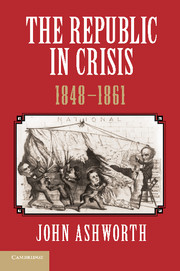Book contents
- Frontmatter
- Contents
- List of Maps and Cartoons
- Chronology of Events
- Introduction
- 1 The United States in 1848
- 2 Crisis at Mid-century, 1848–1851
- 3 Immigrants, Alcoholics and Their Enemies
- 4 Preparing for Disaster
- 5 Political Maelstrom, 1854–1856
- 6 North and South, Republican and Democrat
- 7 Political Polarisation, 1857–1860
- 8 Secession and the Outbreak of War, 1860–1861
- 9 Conclusion
- INDEX
- References
9 - Conclusion
Slavery, Emancipation and the Civil War
Published online by Cambridge University Press: 05 September 2012
- Frontmatter
- Contents
- List of Maps and Cartoons
- Chronology of Events
- Introduction
- 1 The United States in 1848
- 2 Crisis at Mid-century, 1848–1851
- 3 Immigrants, Alcoholics and Their Enemies
- 4 Preparing for Disaster
- 5 Political Maelstrom, 1854–1856
- 6 North and South, Republican and Democrat
- 7 Political Polarisation, 1857–1860
- 8 Secession and the Outbreak of War, 1860–1861
- 9 Conclusion
- INDEX
- References
Summary
Although the nation moved abruptly in April 1861 from peace to war, the critical processes and trends that had caused the conflict did not suddenly cease. As far as party politics were concerned, the Democrats even in the North retained a residual support for slavery. The party would for the duration of the military conflict contain the relatively small number of northerners who were adamantly opposed to the war. More important perhaps, it also contained that much larger number of northerners who, though quite willing to countenance, indeed eager to support, a war to maintain the Union, were not at all keen on a war to free the slaves. As we have seen, the Democratic party from the time of Jefferson had offered a disproportionate amount of support for slavery in the South. Northerners of this persuasion continued to display the racist hostility to African Americans that they had exhibited for more than a generation and to mistrust, again as they had for many decades, the motives of those who proclaimed a humanitarian concern for the slave. At the outset of the war this was not a problem; the goal of the Lincoln administration in prosecuting the war was the restoration of the Union, not the emancipation of the slaves.
Over time, however, the goal changed, despite the opposition of the Democrats. After the great Union victory at Antietam in September 1862, Lincoln issued his Emancipation Proclamation. Although its immediate impact was limited, it set in train a course of events that would culminate in the abolition of slavery in the United States. The war would become a war to free the slaves. How had this transformation occurred?
- Type
- Chapter
- Information
- The Republic in Crisis, 1848–1861 , pp. 193 - 204Publisher: Cambridge University PressPrint publication year: 2012



